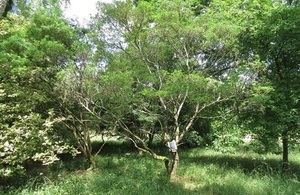Global S&T Development Trend Analysis Platform of Resources and Environment
| Ash dieback found on three new host species of tree in the UK | |
| admin | |
| 2018-08-07 | |
| 发布年 | 2018 |
| 语种 | 英语 |
| 国家 | 英国 |
| 领域 | 气候变化 |
| 正文(英文) | Landscapers, gardeners and tree practitioners urged to report findings via Tree Alert 
The Forestry Commission is urging industry to be vigilant for signs of ash dieback and report suspected sightings through its Tree Alert reporting system. The call comes after three new tree and shrub species in the same family as ash (Oleaceae) tested positive for ash dieback (Hymenoscyphus fraxineus) infection at the Westonbirt Arboretum, Gloucestershire. The findings are unlikely to have a significant impact on the environment as the newly infected species are ornamental and are not widespread or native to the UK. The infection was identified by staff at the arboretum on mock privet, narrow-leaved mock privet and white fringetree – ornamental trees and shrubs from the Mediterranean and North America. The species were found in close proximity to infected ash trees. Forest Research, Great Britain’s principal organisation for forestry and tree related research, is conducting further tests on the nature of the infection. This includes monitoring other species in the Oleaceae family for susceptibility to H. fraxineus infection. A number of these species have already been tested including Osmanthus and Lilac, but were found to be negative. UK Chief Plant Health Officer, Professor Nicola Spence, said:
Over the last five years the Government has invested in world-leading research to advance understanding of the biology and pathology of the disease, including sequencing the ash genome and the ash dieback fungus. It has also funded the world’s largest screening trial for tolerant trees, raising the possibility of an ash breeding programme in the future. In May the Environment Secretary launched the first Tree Health Resilience Strategy - the first major publication to come out of the 25-Year Environment Plan. The strategy sets out a new proactive approach to tree health, with landowners, charities, the public and government working together to take actions to build resilience against pests and diseases to protect the nation’s trees. As part of this approach, a new senior cross-industry Plant Health Alliance to strengthen biosecurity practices across industry has been established. Arboreta also continue to play a critical role in supporting work on ash dieback. Research by Forest Research has identified over 30 different ash species being grown in the main arboreta of Britain which will be used in trials to assess tolerance of these species to ash dieback. Defra and the Forestry Commission continue to work with landowners and local councils, as well as the plant health sector internationally, to share experiences, identify solutions and develop action plans to deal with the impacts of ash dieback. To report a suspected case of ash dieback in any of these newly identified host species, visit the Tree Alert portal.
Published 7 August 2018
|
| URL | 查看原文 |
| 来源平台 | gov.uk-Department for Environment, Food and Rural Affairs |
| 文献类型 | 新闻 |
| 条目标识符 | http://119.78.100.173/C666/handle/2XK7JSWQ/105919 |
| 专题 | 气候变化 |
| 推荐引用方式 GB/T 7714 | admin. Ash dieback found on three new host species of tree in the UK. 2018. |
| 条目包含的文件 | 条目无相关文件。 | |||||
| 个性服务 |
| 推荐该条目 |
| 保存到收藏夹 |
| 查看访问统计 |
| 导出为Endnote文件 |
| 谷歌学术 |
| 谷歌学术中相似的文章 |
| [admin]的文章 |
| 百度学术 |
| 百度学术中相似的文章 |
| [admin]的文章 |
| 必应学术 |
| 必应学术中相似的文章 |
| [admin]的文章 |
| 相关权益政策 |
| 暂无数据 |
| 收藏/分享 |
除非特别说明,本系统中所有内容都受版权保护,并保留所有权利。
修改评论